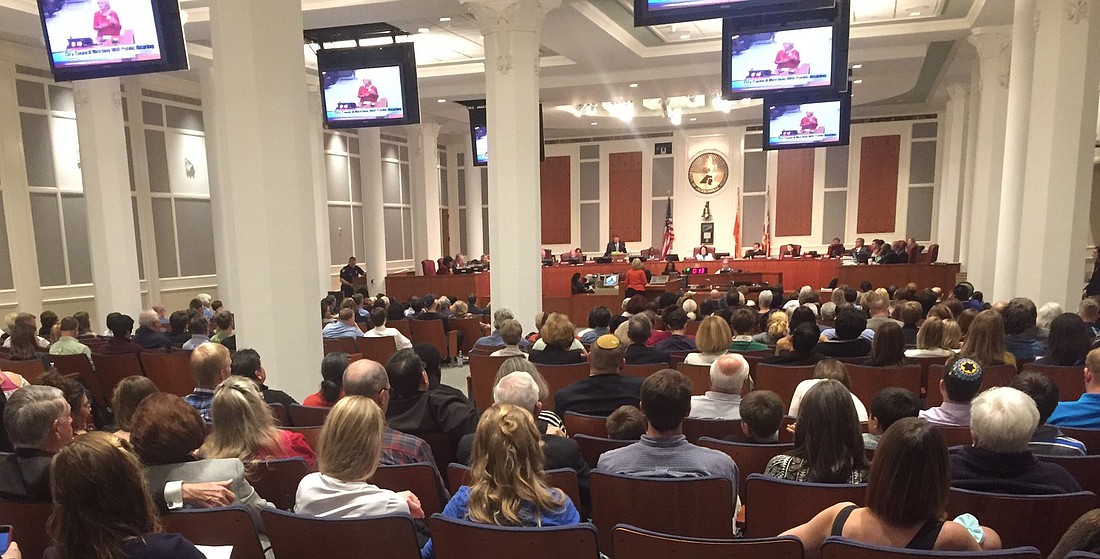
More than a year after it became law, Jacksonville’s Human Rights Ordinance is being challenged in the 1st District Court of Appeals, which is being asked to reverse the dismissal of a similar action filed in the 4th Judicial Circuit shortly after the ordinance was enacted.
The HRO added the categories of “sexual orientation” and “gender identity” to Jacksonville’s existing laws against discrimination in employment, housing and public accommodations.
It was approved by council Feb. 14, 2017, and became law 14 days later without Mayor Lenny Curry’s signature.
A suit was filed in circuit court challenging the ordinance’s validity, but was dismissed on a motion from the city on the grounds the plaintiffs lacked standing to bring the suit and that other questions had been rendered moot by an action of City Council after the HRO was enacted.
The appellants, John Parsons, Robert Assaf, Diamond D Ranch Inc. and Michael Griffin, are represented by Orlando-based Liberty Counsel.
The appeal contends the HRO was enacted in violation of Florida statutes, the city ordinance code and the rules of City Council, specifically that the city failed to give proper notice to the public that 28 sections and subsections of the local ordinance code would be amended to accommodate the additional protected categories.
They state that the HRO as adopted does not include any of the 28 sections and subsections, nor any of the religious exemption provisions that are part of the ordinance code that was adopted before the HRO was enacted.
According to the appeal, Florida law states that ordinances that would revise or amend current law are required to set out in full the revised or amended act, section or subsection or paragraphs that are proposed to be amended, and further that a municipality does not have the authority to lessen or reduce those requirements.
The appellants contend that the HRO is in violation of the city ordinance code because it did not use the previous ordinance code to introduce the revisions and did not include the amended provisions.
The document also alleges further invalidity referring to a council rule that mandates even more stringent disclosure of proposed ordinance changes compared to state requirements.
The language in the HRO is “intentionally vague and abbreviated” and “whatever the political and policy considerations behind the HRO, it was intentionally drafted to hide its effects for the sake of messaging, making it exactly the kind of deceptive legislation the amendatory rules are designed to prevent,” the appeal states.
The appeal contends the city’s alleged failure to comply with Florida statutes was “not an accidental oversight but a purposeful attempt to enact a controversial measure with minimal public scrutiny.”
The HRO that was enacted was five pages, compared to a previous version that failed in 2012 that was more than 20 pages.
The appeal quotes Jacksonville attorney Jimmy Midyette, which it identifies as the principal author of the HRO.
“I did write a new version of the bill that was only five pages long and worked with some of the top lawyers and law firms in the city to get it into a form that was the product of what we’d learned since 2012 about how to message,” he is quoted as saying in an article published Feb. 16, 2017, in the Jacksonville Daily Record.
The appeal also contends that council on April 27, 2017 – about two months after the initial complaint was filed in circuit court – attempted to circumvent the statutory process requirements related to the HRO by enacting a “Recodification Ordinance.”
The recodification applied to the city ordinance code dating back to 1990 and was intended to cure “any single subject and procedural defects in previously enacted ordinances, including the HRO,” according to an excerpt from the ordinance cited in the appeal.
The appeal asks that the dismissal order be reversed and that the case be sent back to the circuit court.
The city has until Aug. 24 to respond to the appeal.